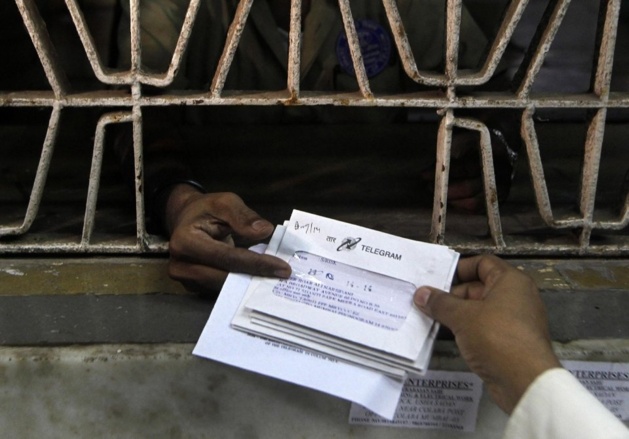
Crédits -- Rajanish Kakade/AP
Having its origin back in 1850 and intended to be a means to communicate for the British East India Company, telegrams have been serving the people for nearly 163 years. Post-independence, this service was held by the postal department for sometime before handing it over to the Department of Telecommunication (DoT). Telegram had its own uniqueness.
People serving in the armed forces got their official communication through telegrams. Any important news good or bad would be sent through telegram. People used this service to greet their loved ones living far apart. Many even recall the different codes for greetings and messages used in telegram services. Before the telephone and mobile phones made their marks, telegram had a vital role to play in common man’s life.
People serving in the armed forces got their official communication through telegrams. Any important news good or bad would be sent through telegram. People used this service to greet their loved ones living far apart. Many even recall the different codes for greetings and messages used in telegram services. Before the telephone and mobile phones made their marks, telegram had a vital role to play in common man’s life.
Role in India’s Independence struggle
Though a relatively new technology back then, telegraph played a decisive role in India’s independence struggle. During the first war of independence in 1857, the telegraph was instrumental in suppressing the revolt. The East India Company used it to mobilize troops and alert potential targets about the revolt. In the year 1942 during Mahatma Gandhi’s Quit India Movement, a protest demanding the British to leave India, the protestors targeted the telegraph lines.
Sad demise
The government of India decided to get done with telegrams after the BSNL (Bharati Sanchar Nigam Ltd.) the public sector undertaking that controls telecommunication reported heavy losses in telegraph service. According to the government, the service annually generated Rs 75 lakhs (approx 120,000 euros) whereas the running cost mounted upto 100 crores (approx 15 million euros). The main reason for telegraph to lose its sheen was the easy availability of faster modes of communication.
Also, the telegram services were slacking by the day owing to shortage of staff. Many offices had just one person who would cycle for miles together to deliver the message. The number of people who used this service dropped drastically with mobile phones and internet becoming more common among the people. Thus, Telegram joined the long list of items that are good enough only to be preserved as antiquities.
Also, the telegram services were slacking by the day owing to shortage of staff. Many offices had just one person who would cycle for miles together to deliver the message. The number of people who used this service dropped drastically with mobile phones and internet becoming more common among the people. Thus, Telegram joined the long list of items that are good enough only to be preserved as antiquities.
The Last Words
The telegraph offices all over the nation witnessed an overwhelming turnout on July 14. All wanted to bid adieu to a service that have existed for nearly two centuries. The number of bookings multiplied several folds with people wanting to have a piece of history as many wanted to become a part of the history. They sent telegrams to their near and dear ones while almost everyone wanted to treasure it as a museum piece. One of the notable high-profile recipients of this historical piece was vice-president of the ruling party, Rahul Gandhi.
A job in telegraph sector once was considered a very respectable one. Prior to being associated with the telecommunication department, it was a service oriented sector. Many had protested against this move of terminating telegraph, but the government turned a deaf ear to them. Authorities cited high operational costs as a reason to put telegraph to rest. Former employees of this sector recall their days in the office to the media. “Telegraph service post witnessed a high number of recruitment back in 1986. Most of those employed back then are set to retire in a few years, just like the 163-year old service”, said a senior official to The New Indian Express.
People have indeed moved into the digital age of mobile phones and computers. Yet, patrons of the previous generation would still recall the tapping sounds in telegraph office, the dots and dashes of Morse codes sent through telegraph lines.
A job in telegraph sector once was considered a very respectable one. Prior to being associated with the telecommunication department, it was a service oriented sector. Many had protested against this move of terminating telegraph, but the government turned a deaf ear to them. Authorities cited high operational costs as a reason to put telegraph to rest. Former employees of this sector recall their days in the office to the media. “Telegraph service post witnessed a high number of recruitment back in 1986. Most of those employed back then are set to retire in a few years, just like the 163-year old service”, said a senior official to The New Indian Express.
People have indeed moved into the digital age of mobile phones and computers. Yet, patrons of the previous generation would still recall the tapping sounds in telegraph office, the dots and dashes of Morse codes sent through telegraph lines.




























